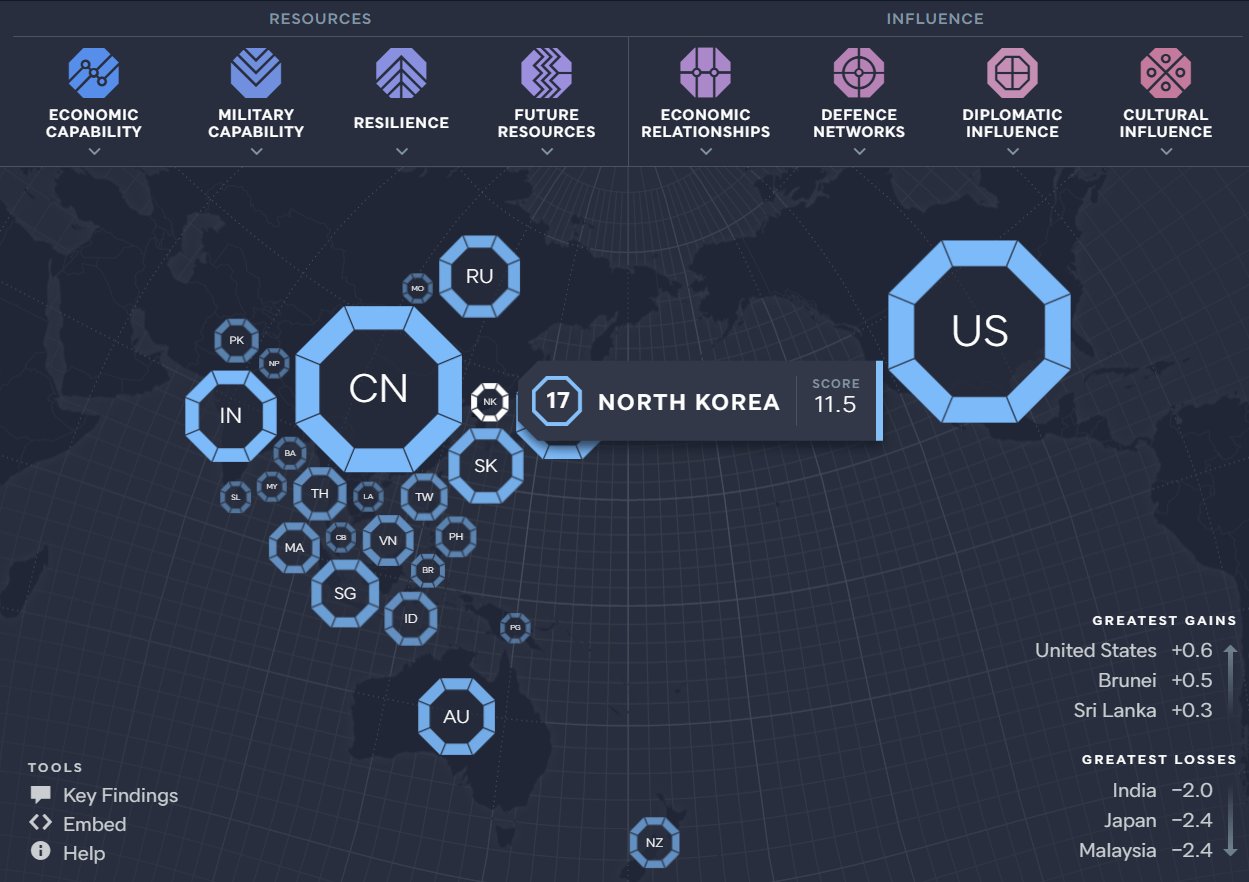North Korea was ranked 17th for its relative power among 26 countries in the Asia-Pacific region, Australia’s Lowy Institute said in an annual report.
The foreign policy think tank on Sunday released its 2021 Asia Power Index report, which comprehensively gauges the power of Asia-Pacific countries by using 131 indicators across eight thematic measures.
The index assessed a wide range of country‘s capacities, including military and economic capabilities, diplomatic and cultural influences, resilience, and future resources.
North Korea remained in 17th, and was followed by nine countries including Brunei, Bangladesh, Sri Lanka, and Myanmar.
Pyongyang’s overall score was 11.5 out of 100. The score declined by 0.8 point from last year mainly due to a huge 5-point drop in diplomatic influence, which measures the scope and standing of the country’s foreign relations.
The Lowy Institute explained Pyongyang “derives its power principally from its military resources and nuclear weapons capability,” labeling it as a “misfit middle power” in the region.
North Korea’s military capabilitiesNotably, North Korea’s military capability outstripped Japan, Australia, Pakistan and Singapore.
North Korea came in at sixth place in terms of military capability, while South Korea was ranked fifth among the 26 countries in the region.
The think tank additionally pointed out that South Korea’s military capability rating remained unchanged from the previous year, whereas North Korea’s score was slightly down.
The military capabilities of Japan and Australia, major allies of the US, also decreased despite its enhanced coordination with Washington to collectively deter China and maintain military balance in the Asia-Pacific region.
Specifically, Pyongyang was ranked fifth for its armed forces, which measure the total number of active military and paramilitary personnel and their readiness posture. Pyongyang outstripped Seoul, which came seventh in armed forces.
In contrast, North Korea was ranked 17th in annual defense expenditure, whose amount is around 10 percent of South Korea’s defense spending.
Pyongyang’s negative power gapAnother key point that the report highlighted was that Pyongyang had the largest negative “power gap“ among the countries. The power gap shows discrepancies between the country’s available resources and global influence.
Pyongyang has a negative power gap as it exerted undersized influence relative to their resources.
The think tank said North Korea was ranked 26th, the lowest among the countries both for economic relationships and cultural influence.
The economic relationship is evaluated based on trade relations, investment ties and economic diplomacy, while cultural influence is the index evaluating a country’s ability to “shape international public opinion through cultural appeal and interaction.”
The Lowy Institute explained Pyongyang’s “diplomatic and economic isolation limits its regional influence resulting in a Power Gap score of –7.3.”
North Korea’s negative power gap “further deteriorated” this year, which means the country exercised less influence than expected, considering its available resources.
In general, US power in the Asia-Pacific region has increased under the Biden administration, as it enhances its collective deterrence with allies and partners against China and takes initiative in regional vaccine diplomacy efforts.
According to the report, the US is the sole country that registered gains in overall scores among the top 10 countries, while the COVID-19 pandemic has attenuated the power of almost all countries this year.
Washington, for the first time in four editions of the Asia Power index, was assessed as having enhanced its regional power, defying its “prevailing regional downward trend.”
China’s regional power, antithetically, was undermined by the COVID-19 pandemic, reversing last year’s trend of emerging diplomatically and narrowing the gap with the US.
This year, the US came out on top, followed by China, Japan, India, Russia and Australia, with South Korea remaining seventh place in the Asia Power Index.
By Ji Da-gyum (
dagyumji@heraldcorp.com)








![[Today’s K-pop] Blackpink’s Jennie, Lisa invited to Coachella as solo acts](http://res.heraldm.com/phpwas/restmb_idxmake.php?idx=644&simg=/content/image/2024/11/21/20241121050099_0.jpg)